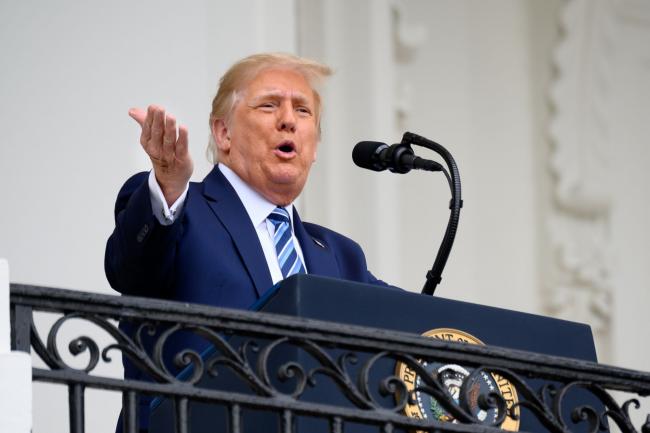(Bloomberg) -- President Donald Trump’s attempt to jolt negotiations on a new economic stimulus plan has left talks at a familiar stalemate with Republicans and well as Democrats balking at his latest offer.
House Speaker Nancy Pelosi and Treasury Secretary Steven Mnuchin are expected to talk more this week. Even if they manage to strike a deal, there’s almost no chance of getting legislation written and passed by Congress before the election, in which control of the White House and the Senate is at stake.
Trump’s whipsaw changes last week -- first calling off talks in a tweet, then saying he wanted a bigger package than even Democrats have proposed -- may have hardened Pelosi’s resolve to stick with the Democrat’s $2.2 trillion proposal. Mnuchin has countered with a $1.8 trillion stimulus plan.
On Sunday Pelosi called the White House offer a “miserable and deadly failure.” Trump accused the House speaker of dragging out the talks in an attempt to “influence the election.”
White House economic adviser Larry Kudlow suggested the administration might increase its offer, without giving specifics.
“The bid and the offer is narrowing somewhat between the two sides,” Kudlow said on CNN’s “State of the Union” program.
Republicans Balk
One big issue for the administration may be Senate Republicans.
Multiple GOP senators participating in a Saturday conference call told Mnuchin and White House Chief of Staff Mark Meadows that any agreement with Democrats that ends up around $2 trillion is too much, according to two people familiar with the call.
One of the people said Mnuchin’s offer to Pelosi wouldn’t have enough Republican votes to pass the Senate without major changes.
Some senators said that the spending levels being discussed were unacceptable and that ballooning the deficit will damage their standing with voters. Others said that a deal of that size would hand Pelosi and the Democrats a major victory right before the election, the person, who spoke on condition of anonymity, said.
There also were objections to some of the policies, including expanding eligibility for the Affordable Care Act, which Republicans have been trying to dismantle, and aid to state governments.
Mnuchin and Meadows told the senators they would relay their concerns to the president, who last week urged the negotiators to “go big.”
Market Bets
Kudlow, on CNN, dismissed grumbling among Republicans, predicting that if an agreement is reached, many “will go along with it.”
Some traders are continuing to bet lawmakers will move closer to reaching a stimulus deal, and that helped major U.S. stock indexes last week higher.
Federal Reserve officials, led by Chairman Jerome Powell, have also stepped up their calls for a broad relief package to shore up the shaky U.S. economy.
Minneapolis Fed President Neel Kashkari said Sunday on CBS’s “Face the Nation” that unless elected leaders take more action, the U.S. will “continue to see a grinding, very slow recovery, with thousands of small businesses around the country going bankrupt.”
‘Targeted’ Aid
Kudlow said the U.S. economy is recovering from the pandemic-induced business shutdowns earlier in the year but there are “some targeted areas of assistance that would help.” He cited aid to the unemployed and to small businesses, and direct payments to individuals.
Mnuchin and Meadows, in a letter Sunday directed at members of the House and Senate, again called for a more narrowly focused stimulus, citing the same areas as Kudlow.
“The all-or-nothing approach is an unacceptable response to the American people,” they wrote, a reference to Pelosi’s insistence that any relief package be broad and include provisions to stem the spread of the coronavirus and assist state and local governments.
With lawmakers from both parties facing tough re-election races already pushing their leaders for a resolution, they said they would continue reaching out to individual members of Congress on a bipartisan basis.
“The president is available to meet as well,” they wrote. Trump has already spoken to some GOP senators.
Pelosi, in a letter to House Democrats on Sunday said there were major issues beyond money, including testing and metrics for determining the spread of the virus.
“Until these serious issues are resolved, we remain at an impasse,” Pelosi wrote. “However, I remain hopeful that the White House will join us to work toward a relief package that addresses the health and economic crisis facing America’s families and will do so soon.”
©2020 Bloomberg L.P.

